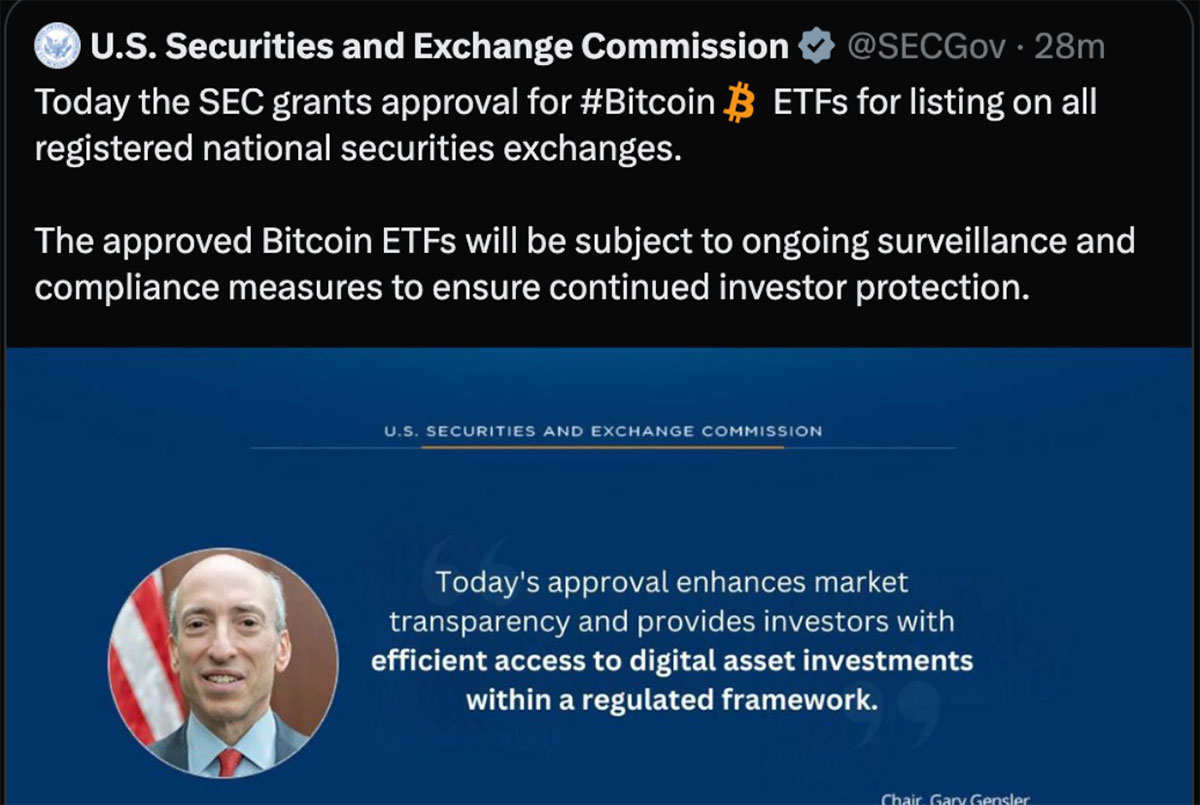
The recent approval of Bitcoin exchange-traded funds (ETFs) by the U.S. Securities and Exchange Commission ("SEC") in January 2024 marked a watershed moment for the cryptocurrency market. This decision not only signifies broader acceptance of digital assets but also expands access for investors seeking exposure to Bitcoin's price movements. However, while Bitcoin ETFs offer a convenient entry point into the crypto space, they may not align with every investor's objectives. Let's delve into the nuances of Bitcoin ETFs and explore when they're suitable and when they're not.
Bitcoin ETFs: A Gateway to Crypto Investing
Bitcoin ETFs represent a significant innovation in cryptocurrency investing, akin to traditional ETFs for gold and other assets. These funds enable investors to indirectly access Bitcoin's price appreciation without the complexities of custody, acquisition, and disposition. By owning shares in a Bitcoin ETF, investors gain exposure to the cryptocurrency market through established financial institutions like Blackrock, Grayscale, Fidelity, and Ark Invest. This accessibility appeals to both novice investors and seasoned allocators, offering a familiar investment vehicle with low fees and simplified access.
Moreover, the advent of Bitcoin ETFs opens doors for retirement account holders, allowing them to incorporate Bitcoin into their 401(K)s and IRAs. This integration reflects the growing demand for digital assets in long-term investment strategies, further bolstering Bitcoin's legitimacy as an investable asset class.
The "One-Way Bridge" Conundrum
Despite their appeal, Bitcoin ETFs pose limitations that investors must consider. The analogy of a "one-way bridge," coined by finance thought leader Dave Nadig, underscores the loss of benefits associated with direct ownership of Bitcoin. Here are three key reasons why direct ownership may be preferable:
- Diversification: Bitcoin ETFs offer exposure solely to Bitcoin's price movements, akin to owning a single stock in a diversified portfolio. However, true diversification entails access to a range of digital assets beyond Bitcoin, ensuring resilience against market fluctuations.
- Access to the Ecosystem: Direct ownership grants investors access to the broader decentralized finance (DeFi) ecosystem, encompassing decentralized exchanges (DEXs) and various cryptocurrencies. This ecosystem fosters innovation, liquidity, and seamless global connectivity, amplifying the potential of digital assets beyond Bitcoin.
- Tax Harvesting: ETF investors forfeit opportunities for tax loss harvesting, a strategy leveraged in volatile markets to offset capital gains with capital losses. Direct ownership allows investors to capitalize on market fluctuations, optimizing tax efficiency and enhancing overall returns.
The Promise of Self-Sovereignty
Beyond financial considerations, direct ownership embodies the ethos of self-sovereignty inherent in Bitcoin's design. By self-custodying their Bitcoin, investors mitigate counterparty risk and safeguard against censorship and asset freezes. This principle aligns with Bitcoin's founding philosophy of empowering individuals to control their wealth without reliance on intermediaries or centralized authorities.
Navigating the Decision
In evaluating the suitability of Bitcoin ETFs, investors must weigh the trade-offs between convenience and control. While ETFs offer accessibility and simplicity, they entail a loss of self-sovereignty and potential benefits associated with direct ownership. Investors should align their decision with their investment goals, risk tolerance, and long-term vision for their portfolios.
Ultimately, the decision to invest in Bitcoin ETFs or pursue direct ownership hinges on individual preferences and objectives. While ETFs provide a convenient on-ramp to the crypto market, direct ownership offers greater autonomy and exposure to the broader digital asset ecosystem. By understanding the nuances of each approach, investors can navigate the evolving landscape of Bitcoin investing with clarity and confidence.
Disclaimer
An offering statement regarding this offering has been filed with the SEC. The SEC has qualified that offering statement, which only means that the company may make sales of the securities described by the offering statement. It does not mean that the SEC has approved, passed upon the merits or passed upon the accuracy or completeness of the information in the offering statement. The offering circular that is part of that offering statement is at https://vdr.ohanae.com/projects/ohanae. You should read the offering circular before making any investment.
Ohanae Securities LLC is a subsidiary of Ohanae, Inc. and member of FINRA/SIPC. Additional information about Ohanae Securities LLC can be found on BrokerCheck. Ohanae Securities LLC is in discussions with FINRA about exploring the expansion of business lines for the broker/dealer. Any statements regarding abilities of Ohanae Securities LLC are subject to FINRA approval and there are no guarantees FINRA will approve the broker/dealer’s expansion.
Ohanae Securities is seeking approval to be a special purpose broker-dealer that is performing the full set of broker-dealer functions with respect to digital asset securities – including maintaining custody of these assets – in a manner that addresses the unique attributes of digital asset securities and minimizes risk to investors and other market participants. If approved, Ohanae Securities will limit its business to digital asset securities to isolate risk and having policies and procedures to, among other things, assess a given digital asset security’s distributed ledger technology and protect the private keys necessary to transfer the digital asset security.